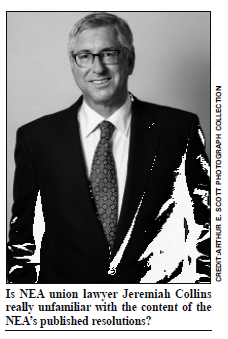Is This Any Way to Run a City’s Schools?
Leaked CTU Proposals Won’t Do Anything to Improve Schools’ Poor Performance
 In Reality, NEA Union Bosses Oppose Higher Pay For Many Teachers
In Reality, NEA Union Bosses Oppose Higher Pay For Many Teachers
(source: National Right to Work August 2015 Newsletter)
At the end of June, the U.S. Supreme Court agreed to take up in its next term Friedrichs v. California Teachers Association, a case in which the extraction of forced fees for union monopoly bargaining from public servants as a condition of employment faces a First Amendment challenge.
Friedrichs is based largely on precedents argued and won by National Right to Work Legal Defense Foundation attorneys on behalf of their employee clients.
And National Education Association (NEA) teacher union and other government union bosses tried desperately to prevent this case from being heard by the High Court.
Union Bosses Insist That Performance-Based Pay For Teachers Is ‘Inappropriate’
In fact, in early April lawyers for the respondents in Friedrichs, officers of the NEA-affiliated California Teachers Association (CTA) union, went so far as to submit a brief urging the High Court not to take the case that flatly contradicted formal resolutions repeatedly issued by their parent union.
For example, the CTA/NEA brief, filed by a team of lawyers led by Jeremiah Collins of the union-label D.C. firm of Bredhoff & Kaiser, is completely inconsistent with this sentence from Section F-9 of the NEA Representative Assembly’s 2014-2015 resolutions:
The NEA union “opposes providing additional compensation to attract and/or retain education employees in hard-to-recruit positions.”
National Right to Work Committee Vice President Mary King explained what this stance, first officially adopted by the NEA Representative Assembly in 2000, means in practice:
“Suppose a school district is having a hard time finding a qualified individual to teach Special Ed, English as a Second Language, Physics, Chemistry or Calculus, for example, and wishes to offer a salary higher than the union-negotiated rate in order to persuade someone who can do the job well to accept it.
“The teacher union brass will definitely oppose the ‘additional compensation.’
“But union kingpins won’t complain if the district ‘solves’ the problem by hiring someone who lacks the knowledge base to do the job well.”
Another example of uncompromising NEA-boss opposition to higher pay for particular classes of educators is also found in Section F-9:
“The Association further believes that performance pay schedules, such as merit pay or any other system of compensation based on an evaluation of an education employee’s performance, are inappropriate.”
Friedrichs Brief Pretends NEA Union Officials Always Back More Pay For Teachers
“Without a doubt,” said Ms. King, “a substantial share of the hundreds of thousands of teachers nationwide who are forced under state law to bankroll NEA-affiliated local and state unions and the NEA itself as a condition of employment believe correctly that they would benefit from a merit-based compensation policy. But union bigwigs unabashedly oppose all such policies.”
If the stance of NEA union officials in opposition to higher compensation for many teachers is plain from the union’s published resolutions, why are Mr. Collins and the rest of the NEA/CTA legal team in Friedrichs pretending that the union hierarchy favors higher pay for teachers in all cases?
The Friedrichs plaintiffs are teachers who do not belong to the CTA union. They do not agree with the positions it takes in acting as K-12 employees’ monopoly-bargaining agent, and do not believe it is permissible under the First Amendment for the state of California to force them to pay $600 a year or more to union officials in order to continue educating children.
They and their attorneys, who belong to the Cleveland-based law firm Jones Day, believe they have a good chance of success in the wake of Foundation clients and attorneys’ 2014 victory in Harris v. Quinn.
The majority opinion in this case acknowledged, for the first time, that the constitutional foundation of public-sector forced union dues is “questionable.”
Do NEA Union Lawyers Really Think They Can Ignore the Content of NEA Resolutions?
In their April brief to the High Court, the NEA legal team insisted that the forced-fee regime to which the plaintiffs object is “simply a requirement that a nonmember teacher who receives . . . additional compensation as a result of the unions’ efforts . . . must pay a share of the unions’ costs . . . .”
“The fact is,” noted Ms. King, “the NEA’s own public resolutions show educators who are well-qualified to teach in subject areas for which there are shortages and educators who school boards believe are performing well-above average often receive lower compensation as a result of ‘unions’ efforts.’
“Do Jeremiah Collins et al really hope to sway the Supreme Court to reject the Friedrichs plaintiffs’ First Amendment claims based on a fantasy about how union monopoly bargaining works, rather than an understanding of how it actually works?
“Only future respondents’ briefs in Friedrichs and the oral argument that will take place either this fall or in the spring of 2016 can settle that question.”

Leaked CTU Proposals Won’t Do Anything to Improve Schools’ Poor Performance

Wherever Big Labor wields the power to collect forced union dues, union bosses funnel a large share of the confiscated money into efforts to elect and reelect business-bashing politicians. Employment growth tends to lag as a consequence.

Members Insist They Keep Pro-Right to Work Campaign Promises